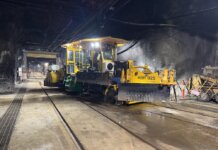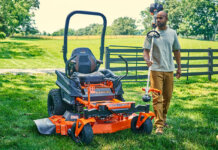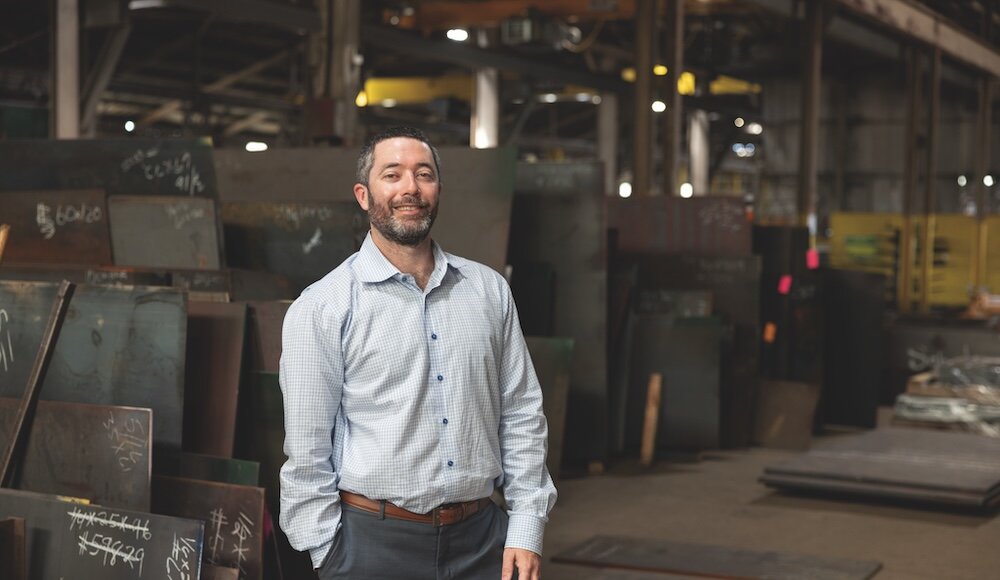
There are few building materials stronger than steel. And there are few bonds stronger than family.
Sabel Steel in Montgomery combines both those elements. The result is a company that has been in business since before the war. No, not World War II. We’re talking about the Civil War.
That’s right. The entity now known as Sabel Steel began way back in 1856 as M. Sabel & Sons, making it one of the five-oldest continually operating businesses in Alabama. The company, which purchases steel in bulk and sells it in smaller quantities to a wide variety of end-users, currently is run by CEO Sean Sabel, the great, great, great grandson of founder Marx Sabel.
“I’m the sixth-generation Sabel to run the business. There is a lot of pride in that,” Sean Sabel says. “It’s an honor to be part of a company that has been around for this long.”
The company began when Marx Sabel moved his family from Kentucky to Montgomery and set up a business selling and bartering hides, furs and leather goods. Early sales books that are still in the company’s possession show a fur list that included skunks, racoons, opossums, foxes, otters, beavers, bears, badgers, wolves and — for one line item — housecat fur.
“I don’t have any idea what that was about,” Sean Sabel says with a laugh. “I just know that pretty much if you could sell or barter it, we would.”
After the Civil War and amid the rapid growth of the steel industry in Alabama, scrap metal became one of the primary products being bartered. Over the ensuing decades, the Sabel business gradually moved away from furs and hides and began focusing more heavily on steel.
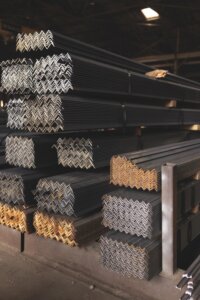
This transition accelerated after World War II, as Sean Sabel’s grandfather and great-uncle began actively purchasing metal in bulk in order to resell it. This process began with the two men driving to the U.S. Steel plant in Fairfield and loading up as much steel as they could fit into their vehicle.
By the mid-1950s, the company was dealing in Army and Navy surplus products, followed in the 1960s by the opening of a rebar fabricating shop. Business ebbed and flowed with the market, but for the most part Sabel Steel enjoyed modest growth through the 1970s and into the ’80s.
Then in 1987, during a period of upheaval and consolidation throughout the steel industry, the company was purchased from the Sabel family in a leveraged buyout. Sean Sabel’s father, Keith Sabel, continued to run the business as CEO. But for the first time in more than 130 years, Sabel Steel was not a family-owned company.
“That was a painful time,” Sean Sabel says. “Venture capitalists buy companies and then only care about making money off them. It took away from the aspect of the business that we love, which is to treat everyone — our customers and employees — like family.
“My dad was not pleased with how everything was going in that aspect. So, he decided to buy it back. It took him 13 years, but in 2000 he raised enough cash to buy the company and put it back into the Sabel family.”
After that experience, Keith Sabel wanted to grow the company to help ensure that it would never be gobbled up like that again. So, Sabel Steel began a steady process of expansion and acquisition. In addition to the 13-acre headquarters and primary scrap yard along the Alabama River in Montgomery, the company now has steel-supply service centers in Anniston, Dothan, Mobile (Theodore) and Tuscaloosa (Woodstock) in Alabama, plus sites in Newman and Winder, Georgia; Baton Rouge, Louisiana; and Beaumont, Texas.
“We buy truckload quantities of metal from the steel mills, warehouse it, and then break it down and sell it,” Sean Sabel says. “We’ll have people who want two pieces of this or five pieces of that, so we’ll cut it to length for them. We sell to companies, fabricators, OEMs, bridge manufacturers, automotive, individuals. If they use metal, we’re going to try to sell it to them.”
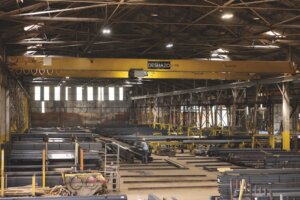
Overall, Sabel Steel has expanded to nearly 300 employees and maintains an average steel inventory of approximately 35 million pounds (17,500 tons). This includes a new focus on stocking aluminum and stainless steel.
“It’s another avenue for sales and diversification,” Sean Sabel says. “We don’t want our only product to be carbon steel. We want to be a one-stop shop for all these products.”
As a result of these changes, Sabel Steel’s average annual revenue has increased to approximately $170 million. Sean Sabel says the company currently is on solid financial footing, and will continue to pursue strategic expansion, including branching into the growing market of electronic-scrap items.
“My dad used to always say that this business can be feast or famine, and when it’s feast you have to be smart, because famine is probably coming,” Sean Sabel says. “We’ve been smart with cash flow and investments, not getting ahead of ourselves. That’s the way we can continue to expand and grow.”
The biggest change in Sabel Steel recently has been in the CEO office. Sean Sabel began moving into that role a few years ago, after his father was diagnosed with an illness. Sean was named president and CEO last July, officially becoming the sixth generation of the Sabel family to run the business. Keith Sabel passed away in February at the age of 75.
“I started here by working in the scrapyards and sorting scrap metal, and I’ve worked my way up since then,” Sean Sabel says. “But even though I’ve been preparing for this, I like the group-think way of doing things. Several people, including CFO Jason Nickles and Vice President Brian Sherwood, have been very helpful during this transition. They bring different perspectives on things and help guide me in financial and operational decisions.”
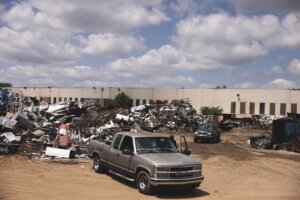
Sherwood, who has worked for various companies in the steel industry for nearly 30 years and has been with Sabel Steel since 2015, says he has been impressed with Sean Sabel’s commitment to the business that bears his family’s name.
“Sean is an inspirational leader,” Sherwood says. “The first time I saw him here, he was outside running a bandsaw, covered in grease and dirt. I was thinking, ‘This is the owner’s son?’ But that’s why Sabel Steel has been in business for so long. They understand the legacy. They work from the ground up. They learn all aspects of the company. That’s what Sean did, and it’s going to help him in the long run leading the company forward.”
At the moment, Sean is the only Sabel involved in the business. He has two children, but they are ages 5 and 3. So it will still be a few decades before it is known whether a seventh generation Sabel eventually will be running Sabel Steel.
“I’m just going to do my own thing with the company for a while, and then gauge their interest when they get older,” Sabel says. “Then we’ll see about the future.”
For now, the present — and a nearly 170-year past — are more than enough for Sabel Steel.
Cary Estes and Cary Norton are Birmingham-based freelance contributors to Business Alabama.
This article appears in the September 2025 issue of Business Alabama.


